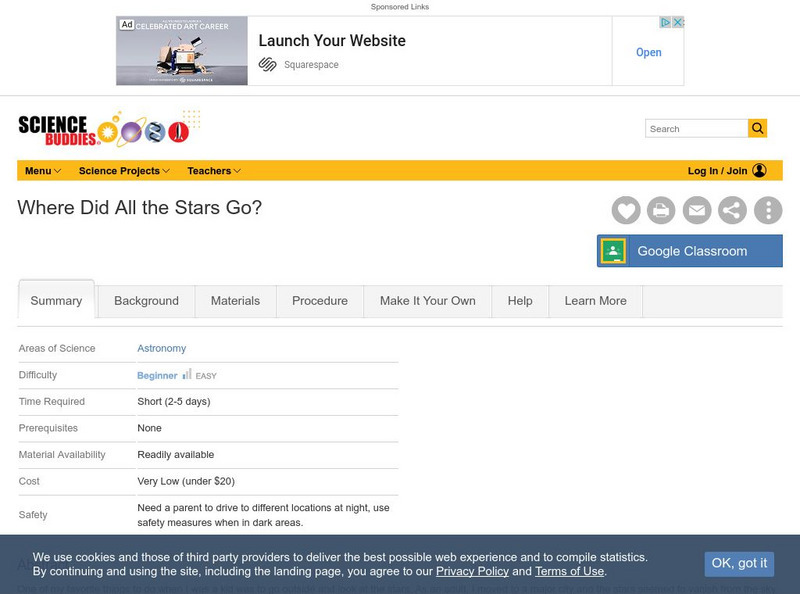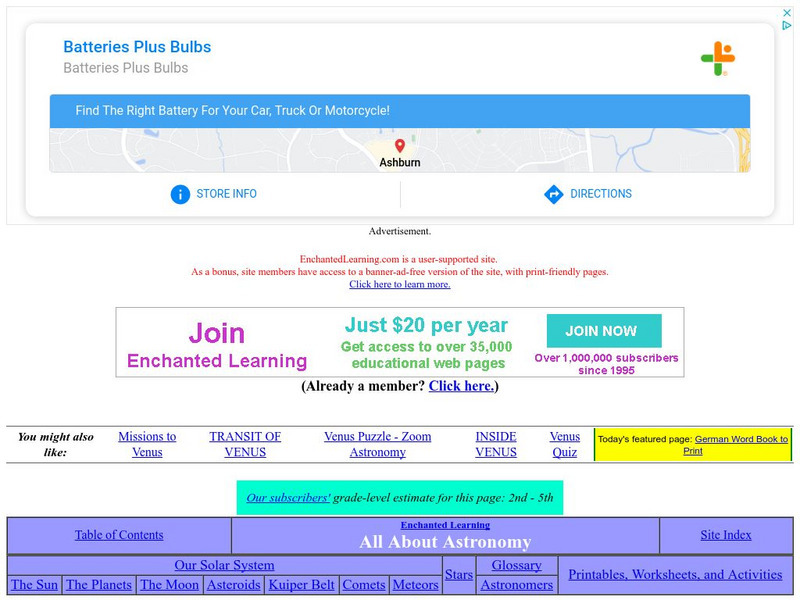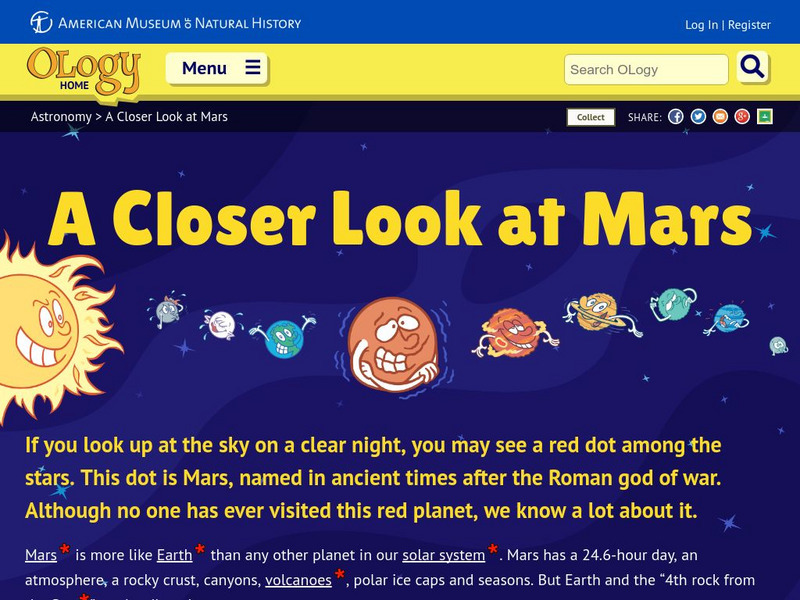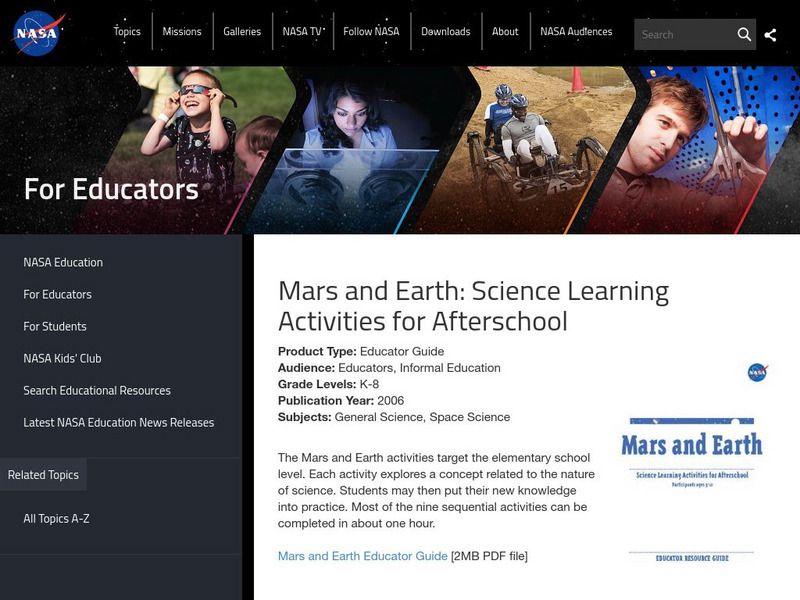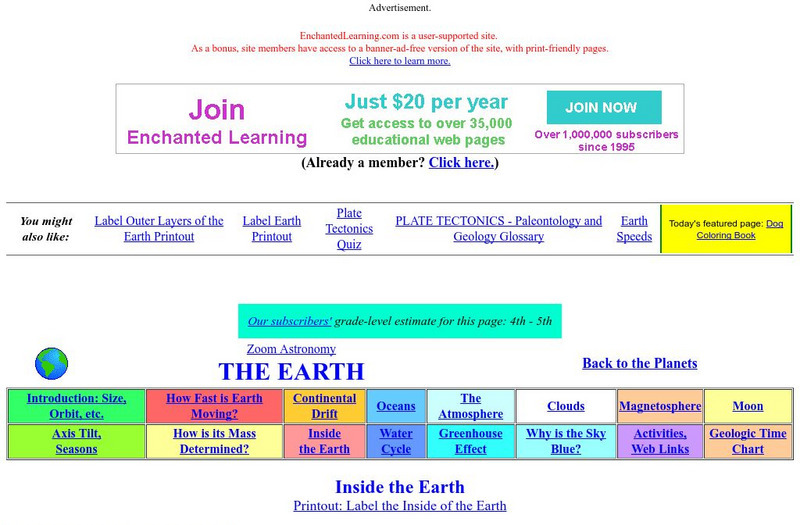Smithsonian Institution
National Air and Space Museum: Exploring the Planets: Early Discovery
This section of the exhibition gives the history of the discovery and study of space starting with the Greeks and Romans through to the early 1900's.
Exploratorium
Exploratorium: A Guide to Astronomy Resources
A portal to resources on the sun, the Earth's neighboring planets, and the weather in space. Find out why Saturn is the "jewel of the Solar System" and explore what happens when Venus and Mercury make their rare transits across the sun.
American Museum of Natural History
American Museum of Natural History: Ology: Astronomy: In Pictures: Beyond Planet Earth
What would it be like to travel across the solar system and explore space? Take a look at some of the places that humans might go to someday, and the questions that scientists are asking.
Other
University of Leicester: The Solar System
Resource explores the solar system, with an in depth discussion of each of the planets and their properties.
Ducksters
Ducksters: Astronomy for Kids: The Planet Jupiter
Kids learn about the planet Jupiter of the Solar System including fun facts, mass, day, year, and distance from the Sun. Astronomy for kids and teachers.
Ducksters
Ducksters: Astronomy for Kids: The Planet Mars
Kids learn about the planet Mars of the Solar System including fun facts, mass, day, year, and distance from the Sun. Astronomy for kids and teachers.
Ducksters
Ducksters: Astronomy for Kids: The Planet Mercury
Kids learn about the planet Mercury of the Solar System including fun facts, mass, day, year, and distance from the Sun. Astronomy for kids and teachers.
Ducksters
Ducksters: Astronomy for Kids: The Planet Neptune
Kids learn about the ice giant planet Neptune of the Solar System including fun facts, mass, day, year, and distance from the Sun. Astronomy for kids and teachers.
Ducksters
Ducksters: Kids Science: Learn About the Dwarf Planet Pluto
Kids astronomy. What is Pluto like? How do we know about this dwarf planet?
Smithsonian Institution
Smithsonian Learning Lab: The Universe, an Introduction
Start with the questions all students ask: How big is the universe, how far away are the planets and stars, how did they form and when, how do they move and why? Build on their natural curiosity. The Smithsonian, in cooperation with...
Science Buddies
Science Buddies: Where Did All the Stars Go?
If you live in a big city or urban area it is hard to see many stars at night. In most urban areas only the most brilliant stars, planets and the moon can be seen. This is because of something called light pollution which is the...
Enchanted Learning
Enchanted Learning: All About Space: Venus
All About Space profiles the planet Venus with information about its size, mass, atmosphere, length of day, and the like. Features include interactive activities and learning exercises.
Cool Math
Coolmath: Science Monster: Earth
Read about the vital statistics, composition, and other facts about our home planet, Earth.
Cool Math
Coolmath: Science Monster: Introduction to Our Solar System
Find out about all the planets and other solar system characteristics in this colorful, illustrated tutorial on our neighborhood in space.
American Museum of Natural History
American Museum of Natural History: O Logy: A Closer Look at Mars
If you look up at the sky on a clear night, you may see a red dot among the stars. This dot is Mars, named in ancient times after the Roman god of war. Although no one has ever visited this red planet, we know a lot about it. This site...
Cool Math
Coolmath: Science Monster: Our Sun
Find out about our closest star, the sun. Read interesting facts and other trivia about our planet's source of energy.
Cool Math
Coolmath: Science Monster: Mercury
A cool fact sheet about Mercury including a place for students to enter their weight on Earth to convert it to what it would be on Mercury.
Cool Math
Coolmath: Science Monster: Saturn
A cool fact sheet about Saturn including a place for students to enter their weight on Earth to convert it to what it would be on Saturn.
Cool Math
Coolmath: Science Monster: Neptune
A cool fact sheet about Neptune including a place for students to enter their weight on Earth to convert it to what it would be on Neptune.
Cool Math
Coolmath: Science Monster: Jupiter
A cool fact sheet about Jupiter including a place for students to enter their weight on Earth to convert it to what it would be on Jupiter.
Cool Math
Coolmath: Science Monster: Pluto
A cool fact sheet about Pluto including a place for students to enter their weight on Earth to convert it to what it would be on Pluto.
NASA
Nasa: Mars and Earth: Science Learning Activities for Afterschool
This set of activities teaches students about the big picture of science using Mars as an example: how to collect data, use evidence, and look at models.
Enchanted Learning
Enchanted Learning: Inside the Earth
This resource has numerous diagrams and descriptions of the earth's interior layers. Worksheets of the various layers are also available to be downloaded.









